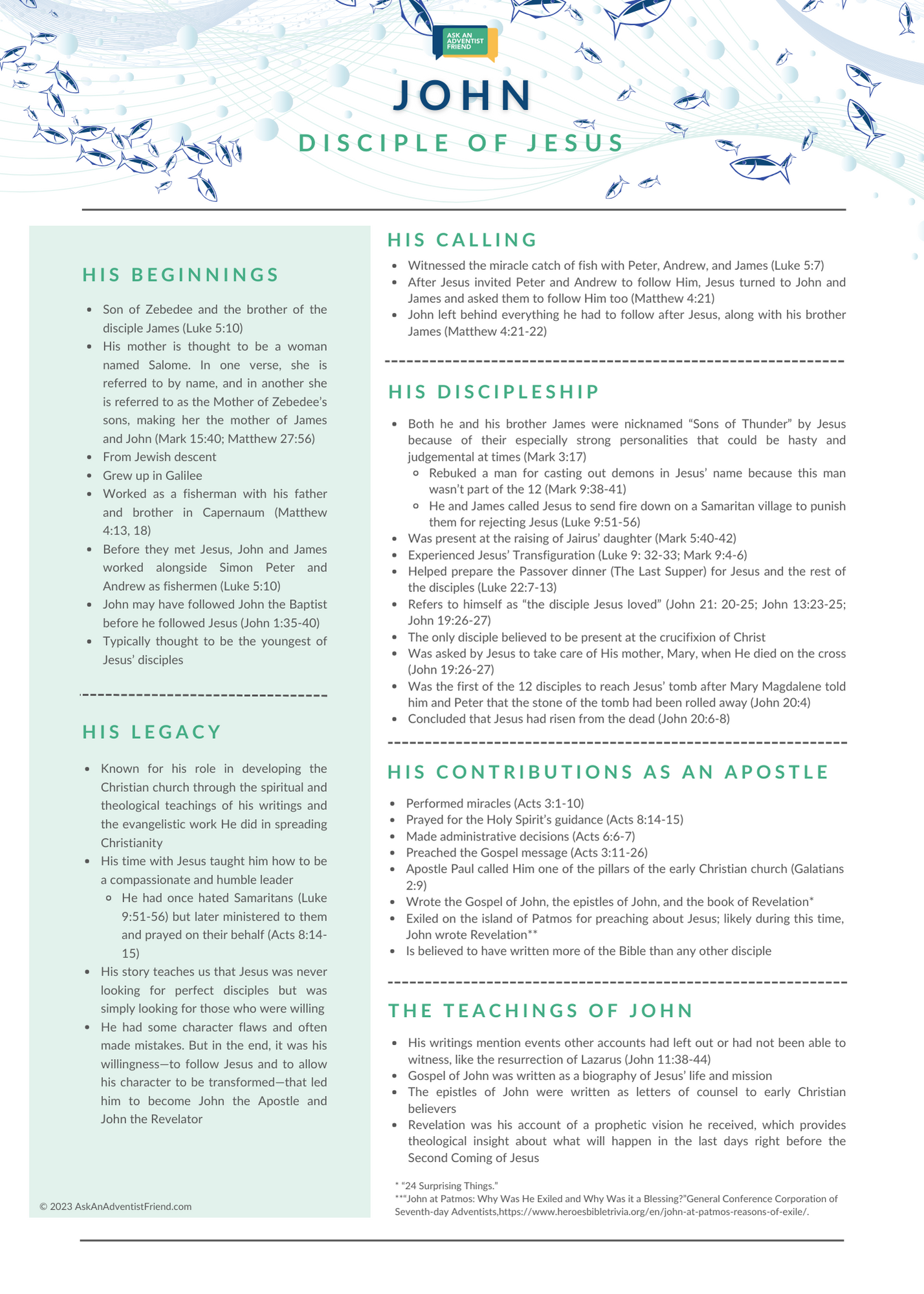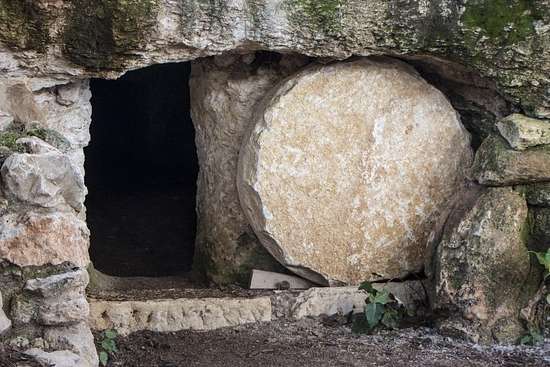Who was the Apostle John—the “Disciple Jesus Loved”?
 John, the brother of James, was likely the youngest of the 12 disciples. And yet he was present for the most pivotal events in Jesus Christ’s ministry, some of which only a few of the disciples witnessed.
John, the brother of James, was likely the youngest of the 12 disciples. And yet he was present for the most pivotal events in Jesus Christ’s ministry, some of which only a few of the disciples witnessed.
Overall, his time with Jesus prepared him to become a prominent leader and writer in the early Christian church.
There’s a lot packed into the life of this apostle, so let’s go through his life step by step:
- John’s beginnings
- The calling of John
- John’s discipleship
- John’s contributions as an apostle
- The teachings of John
- John’s legacy
We’ll start with what we know from before he became a disciple of Jesus.
John’s beginnings
The New Testament tells us that John was the son of Zebedee and the brother of the disciple James (Luke 5:10).
John is typically thought to be the youngest of the disciples of Jesus.1 John is always mentioned as the brother of James,2 and according to the customs of his time, the older sibling would be mentioned first.
Like the other disciples, James and John were Jewish.3 They grew up in Galilee, a northern region of Israel4 that had long since been conquered by the Empire of Rome.
The Galileans, like many Jews, were unhappy with Roman rule.5 After a long history of political unrest and revolts,6 most Jews relied on the hope of the promised Messiah, waiting for Him to come and deliver them from Roman occupation.7
In the meantime, John and James both worked as fishermen in Capernaum (Matthew 4:13, 18). There, they fished alongside workmen their father had hired (Mark 1:20) and other fishermen, like the brothers Simon Peter and Andrew (Luke 5:10), who also became disciples.
What these pairs of brothers hadn’t yet realized was that their grueling work would one day lead them to meet the Messiah they had heard about.
The calling of John

Image by Harrison Haines
The day Jesus called John to be His disciple started off like any other.
John and his brother were on their fishing boat when they were called by their fishing partners, Simon Peter and Andrew, to help them haul in their nets (Matthew 4:18-21; Luke 5:1-11).
They needed John and his brother’s help because they had caught a lot of fish—so much so that the boat was starting to sink from the weight as they tried to pull in the nets (Luke 5:7)!
This was especially noteworthy because Peter and Andrew had been fishing all day without a single catch. It was only when a man named Jesus instructed them to cast their nets in a different spot that they caught more fish than they ever could have imagined.
Because of this miracle, Peter realized that the man who helped them was no ordinary man, but the Messiah himself (Luke 5:8).
It was then that Jesus called Peter and Andrew to become His disciples. He told them they would no longer be catching fish, but “catching people” (Luke 5:10, CSB). From then on, their job was to teach others about Jesus Christ (Mark 1:17).
When Jesus turned to John and James, He asked them to follow Him too (Matthew 4:21). Just like Peter and Andrew, John and his brother were quick to agree. And in the end, they left behind everything they had to follow after Jesus (Matthew 4:21-22).
Joining the disciples

Image by EKATERINA BOLOVTSOVA
In accepting Jesus’ call at the Sea of Galilee, John and his brother became some of Jesus’ first disciples.
Later on, Jesus would add more disciples to the group, selecting men of varying ages, classes, professions, and personalities.
These differences caused some of the disciples to clash with one another, especially where personalities were concerned.
And of the 12 disciples, Scripture hints that John and his brother had especially strong personalities.
They could be hasty and judgmental at times, prone to jumping to conclusions. They often had harsh words toward anyone they thought didn’t measure up to their standards. But even while they were quick to point fingers at others, they were slow to acknowledge their own flaws and shortcomings.
On one occasion, John rebuked a man for casting out demons in Jesus’ name, because this man wasn’t part of the 12 (Mark 9:38-41). Another time, he and James called Jesus to send fire down on a Samaritan village to punish them for rejecting Jesus (Luke 9:51-56).
But on both occasions, Jesus corrected John, calling him to seek out unity and peace instead of division and destruction (Mark 9:39-40; Luke 9:55-56). The brothers’ eagerness to punish who they believed to be wrong-doers might very well be the reason Jesus called them “Boanerges,” or “Sons of Thunder” (Mark 3:17).
They still had much to understand about what Jesus’ mission truly was.
It seems that they, like many Jews, were more focused on how Jesus could help them gain earthly victory—specifically over the Romans.
It’s the classic human tendency to dwell upon what’s currently happening to us in our own corners of the world, rather than thinking bigger.
Jesus’ ministry had much bigger plans—victory over sin, for all of humanity.
But they were so fixated on the idea of political authority that they supported their mother’s request to Jesus, that they be seated at His left and right hands when He ascended to His (earthly) throne (Mark 10:35-45; Matthew 20:20-28).
But over time, Jesus helped them understand what His kingdom was really like (Luke 9:25-28). He showed them that what mattered most in the kingdom of God wasn’t a person’s status, but the condition of their character.
Jesus reiterated this idea to the disciples throughout His time with them, teaching them how to value love and humility over selfishness and worldly gain.
Day by day, Jesus’ servant leadership helped the disciples develop the right focus and mindset, eventually preparing them for their roles as apostles.
And John was no exception.
In the time he spent with Jesus, John went from being known as “a son of Thunder” to “the disciple whom Jesus loved.”
John’s discipleship
Though Jesus loved all of His disciples, He was especially close to Peter, James, and John. These three have long been considered the “inner circle” of the 12 disciples.
For his part, John was so close to Jesus that he got to witness some of the most pivotal moments in Jesus’ ministry.
The healing of Jairus’ daughter
The disciples witnessed many miracles throughout Jesus’ ministry, but only John, James, and Peter were present for the resurrection of a synagogue’s leader’s daughter.
As Jesus and his disciples made their way to the dead child, the townspeople mocked Him, wondering what He could possibly do for her now that she was no longer alive.
“But when He had put them all outside, He took the father and the mother of the child, and those who were with Him, and entered where the child was lying. Then He took the child by the hand, and said to her, “Talitha, cumi,” which is translated, “Little girl, I say to you, arise.” Immediately the girl arose and walked, for she was twelve years of age. And they were overcome with great amazement” (Mark 5:40-42, NKJV).
This miracle gave John a glimpse of Jesus’ great power and compassion. But it was far from the last miraculous thing John would experience in the company of Jesus.
The Transfiguration
Upon a tall mountain, Jesus was praying even as His disciples were fast asleep (Luke 9:32).
But as He began to pray, He was transfigured, or became spiritually radiant with light. His face and clothes began to glow with light (Matthew 17:2-3).
Moses and Elijah then appeared to speak with Him about what He was about to undergo on the Cross (Luke 9:31).
As Jesus, Moses, and Elijah were talking, John and the others began to wake. They saw the glory of Jesus and recognized the men with Him, and were filled with fear (Luke 9: 32-33; Mark 9:4-6).
When Moses and Elijah had finished speaking with Jesus, a cloud appeared and took them away. At the same time, the disciples heard a voice speaking from the cloud, saying:
“This is My beloved Son. Hear Him!” (Luke 9:35, NKJV).
Though John was likely overwhelmed by the experience, like any of us would have been, he had been given the honor of hearing God’s voice. We can only imagine how much this must have strengthened his faith in Jesus.
The Last Supper

Photo by James Coleman on Unsplash
When it came time for the Last Supper, Jesus called John and Peter to prepare the Passover dinner for Him and the rest of the disciples (Luke 22:7-13).
Jesus knew this would be the last meal He would ever eat with His disciples, and He trusted John and Peter to set it up as He asked.
Jesus’ care for John is further emphasized by the idea that John is known as “John the beloved” or as “the disciple whom Jesus loved.”8
Though Scripture doesn’t specifically state in one sentence that John is the beloved disciple, verses at the end of the book of John identify the beloved disciple as the author of the book of John (John 21: 20-25), which is widely believed to be none other than the apostle John.9
If we take this to be true, that means that John was the one to sit beside Jesus and ask Him who would betray Him.
“Lying back on Jesus’ chest was one of His disciples, whom Jesus loved. So Simon Peter nodded to this disciple and said to him, ‘Tell us who it is of whom He is speaking.’ He then simply leaned back on Jesus’ chest and said to Him, ‘Lord, who is it?’” (John 13:23-25, NASB).
The fact that this disciple was able to lean on Jesus and speak to Him so frankly is further evidence that John, out of all the disciples, was especially close to Jesus.
The Garden of Gethsemane
It was John, James, and Peter that Jesus called to be with Him as He prayed in the Garden of Gethsemane (Matthew 26:37).
Though John and the others were eager to follow Jesus, they didn’t understand the importance of this occasion.
Jesus went to the garden to pray for God to give Him the strength He needed to fulfill His mission. He knew the pain and heartbreak that awaited Him on the Cross. The agonizing idea of being separated from His Heavenly Father actually caused Him to sweat blood (Luke 22:44).
And yet, in one of the darkest moments in Jesus’ life, John and the other disciples let Jesus down.
“Then He came to the disciples and found them sleeping, and said to Peter, ‘What! Could you not watch with Me one hour? Watch and pray, lest you enter into temptation. The spirit indeed is willing, but the flesh is weak’” (Matthew 26:40-41, NKJV).
But even after Jesus warned John and the others to stay awake, they fell asleep again moments later.
“And He came and found them asleep again, for their eyes were heavy. So He left them, went away again, and prayed the third time, saying the same words. Then He came to His disciples and said to them, ‘Are you still sleeping and resting? Behold, the hour is at hand, and the Son of Man is being betrayed into the hands of sinners. Rise, let us be going. See, My betrayer is at hand’” (Matthew 26:43-46, NKJV).
Like all of us, John suffered from human weakness. Without God, he was powerless to stay awake.
But even as John failed to pray by Jesus’ side in the Garden of Gethsemane, he later found the strength to stand by Him as He hung on the Cross.
Jesus’ crucifixion
Of all 12 disciples, John is the only one believed to be present for the crucifixion of Christ.
Just like Jesus had predicted, the other disciples had scattered when Jesus was captured (Matthew 26:31). Even Peter, one of Jesus’ closest disciples, had denied and abandoned Him (Matthew 26:69-75).
Only John, the disciple whom Jesus loved, stood by the Cross as Jesus died.
In the end, John remained loyal to Jesus, even agreeing to look after Jesus’ mother when He passed.
“When Jesus saw His mother and the disciple He loved standing there, He said to His mother, ‘Woman, here is your son.’ Then He said to the disciple, ‘Here is your mother.’ And from that hour the disciple took her into his own home” (John 19:26-27, CSB).
It’s difficult to imagine what John must have felt, watching his friend and Savior hanging on the Cross.
Fortunately, John wasn’t left with the heartbreak of Jesus’ passing for long. He was among the first disciples to learn of Jesus’ resurrection.
Jesus’ Resurrection
John was the first disciple to reach Jesus’ tomb after Mary Magdalene told him and Peter that the stone of the tomb had been rolled away (John 20:4).
But for all of his eagerness, he waited for Peter to arrive and inspect the tomb before he went in himself (John 20:5-8).
When Peter had confirmed that Jesus was gone, with only His grave clothes left behind, John concluded that Jesus had risen from the dead (John 20:6-8).
Perhaps being witness to the raising of Jarius’ daughter had led him to this conclusion.
Whatever the case, John’s time with Jesus surely helped him better understand what Jesus’ ministry was all about. And in the end, this, along with the way Jesus was able to transform John’s character, helped him become the leader the early church needed.
John’s contributions as an apostle

Photo by Jakob Braun on Unsplash
Shortly before Jesus returned to heaven at His ascension, He gave His disciples the commission that they go from country to country, telling others the blessed hope of the gospel message.
But it was quite the transformation for the disciples. They had to go from being students to teachers. For his part, John had to go from being the youngest disciple to becoming an apostle of an entirely new religious movement.
But Jesus didn’t leave them to figure it all out on their own. He sent the Holy Spirit to guide them.
The book of Acts tells us that the disciples received the Holy Spirit at Pentecost while they were in Jerusalem (Acts 1:2-5; 2:1-13).
Through the guidance of the Holy Spirit, John took an active role in church leadership, oftentimes working alongside Peter to:
- Perform miracles (Acts 3:1-10)
- Pray for the Holy Spirit’s guidance (Acts 8:14-15)
- Make administrative decisions (Acts 6:6-7)
- Preach the gospel message (Acts 3:11-26)
John became such an important leader that the Apostle Paul called him one of the pillars of the early Christian church (Galatians 2:9).
It was also during John’s time as an apostle that he was believed to have authored several books of the Bible.
As a matter of fact, many people credit him with writing the Gospel of John, the three epistles of John, and the book of Revelation.10
And the same fervor that earned him the “Son of Thunder” nickname eventually was applied to his ministry as an apostle. He was exiled on the island of Patmos for preaching about Jesus. But his captors couldn’t keep him from serving God. It was likely during this time that John wrote Revelation.11
It was through books like this that John was able to deliver theological and spiritual messages that would guide and encourage readers around the world even over a thousand years later.
The teachings of John

Image by Sang Valte from Pixabay
Through the three works of literature believed to be authored by John, we gain a unique perspective of Jesus and His ministry and purpose.
In the Gospel According to John, he offered his own up-close-and-personal perspective on the events surrounding Jesus’ life. He mentioned events other accounts had left out or not been able to witness, like the resurrection of Lazarus (John 11:38-44).
But while the Gospel of John was written as a biography of Jesus’ life and mission, the epistles of John were written as letters of counsel to early Christian believers. Altogether, they warn Christians not to follow after false teachers,12 and instead pursue the life God has called them to live—one motivated by love and compassion.13
Meanwhile, the book of Revelation presents an entirely different kind of work. While his other books focused on themes of discipleship and love, Revelation was his account of a prophetic vision he received. We get glimpses of the end times, providing more theological insight about what will happen in the last days right before Jesus returns at His Second Coming.
John’s writings also help us see how he matured as a disciple of Christ.
The Gospel of John gives us a look at his early growth as a disciple of Jesus, while his epistles demonstrate how he had grown influence to become a church leader.
And in the book of Revelation, his role had truly grown from a disciple to a prophet. God entrusted John with the task of recording what he was shown about how the Great Controversy began, what it did to our world, and Jesus’ incredible role in God’s promise of redeeming us and putting an end to sin forever.
All in all, John’s writings helped the church better understand the life of Jesus, what it means to be a disciple for Christ, and the ultimate plan Jesus has for His followers right up through the end of time.
John’s legacy

Image by James Nichols from Pixabay
Today, the apostle John is known for his role in developing the Christian church through the spiritual and theological teachings of his writings and the evangelistic work he did in spreading Christianity.
Though John was invested in Jesus’ ministry from the start, his story shows us just how much John grew in his relationship with Christ. His time with Jesus taught him how to be a compassionate and humble leader.
He had once hated Samaritans (Luke 9:51-56), but later ministered to them and prayed on their behalf (Acts 8:14-15).
He had once questioned Jesus about the signs of the end times (Mark 13:3, 29) only to later be given the responsibility of sharing the events of the end times with the world through the book of Revelation.
In the end, John’s story teaches us that Jesus was never looking for perfect disciples. He was looking for those who were willing.
John left behind his entire home, job, and family to follow Jesus. Like all of us, he had some character flaws and often made mistakes. But in the end, it was his willingness—to follow Jesus and to allow his character to be transformed—that led him to become John the Apostle and John the Revelator.
Want to learn more about Jesus’ disciples?
- Before they met Jesus, John and James worked alongside Simon Peter and Andrew as fishermen (Luke 5:10).
- John is believed to be the youngest disciple.
- John may have followed John the Baptist before he followed Jesus (John 1:35-40).
- Jesus called John and James “Sons of Thunder” (Mark 3:17).
- John refers to himself as the disciple Jesus loved (John 21: 20-25; John 13:23-25; John 19:26-27).
- Jesus asked John to take care of His mother, Mary, when He died on the cross (John 19:26-27).
- John is credited with writing the Gospel of John, the epistles of John, and the book of Revelation.
- John is believed to have written more of the Bible than any other disciple.
- According to tradition, John is the last disciple to die. And he’s the only one to die of natural causes.
- According to tradition, John was sentenced to be boiled in oil, although he survived without any injury.
- His mother is thought to be a woman named Salome. In one verse, she is referred to by name, and in another she is referred to as the Mother of Zebedee’s sons, making her the mother of James and John (Mark 15:40; Matthew 27:56).
- “24 Surprising Things About the Disciple Whom Jesus Loved,” General Conference Corporation of Seventh-day Adventists, https://www.heroesbibletrivia.org/en/the-disciple-whom-jesus-loved/. [↵]
- Luke 5:10; Matthew 4:21; Mark 1:19; Mark 3:17. [↵]
- “24 Surprising Things.” [↵]
- “Galilee,” Encyclopedia Britannica, https://www.britannica.com/place/Galilee-region-Israel. [↵]
- Skinner, C., Andrew, “A Historical Sketch of Galilee,” Brigham Young University, https://byustudies.byu.edu/article/a-historical-sketch-of-galilee/. [↵]
- Ibid. [↵]
- “Messiah,” Encyclopedia Britannica, https://www.britannica.com/topic/messiah-religion. [↵]
- “24 Surprising Things.” [↵]
- Ibid. [↵]
- “24 Surprising Things.” [↵]
- “John at Patmos: Why Was He Exiled and Why Was it a Blessing?” General Conference Corporation of Seventh-day Adventists, https://www.heroesbibletrivia.org/en/john-at-patmos-reasons-of-exile/. [↵]
- 1 John 4; 2 John 1:7-11; 3 John 1:9-12. [↵]
- 1 John 5; 1 John 4; 2 John 1:4-6; 3 John 1:5-8. [↵]
- “24 Surprising Things.” [↵]
Questions about Adventists? Ask here!
Find answers to your questions about Seventh-day Adventists
More Answers
The Health Benefits of Fresh Air You Should Know About
The Health Benefits of Fresh Air You Should Know About“When you can’t breathe, nothing else matters,” the American Lung Association tells us. And while that’s true, the kind of air you’re breathing will determine the health benefits you experience. Breathing fresh...
What Do Seventh-day Adventists Choose to Eat?
What Do Seventh-day Adventists Choose to Eat?Food blogs overwhelm the internet; food fads are all the rage; and copycat and healthy versions of food are the subject of many a get-together. Eating—and eating the best way—is a big deal. And everybody has a different...
10 Incredible Ways Sunlight Can Improve Your Health
10 Incredible Ways Sunlight Can Improve Your HealthAre you concerned about sunlight’s negative effects? You might be the one who lathers on the sunscreen and covers up when you go outside. Or maybe you avoid being outside as much as possible. You might be surprised,...
Why Is Water So Important?
Why Is Water So Important?We all know that water is a substance we can’t live without. It quenches our thirst and keeps us hydrated on the inside. And it’s necessary for hygiene and cleansing on the outside too. But did you know that the cleansing properties of water...
Ellen White’s Writings and the Adventist Health Message
Seventh-day Adventists are known for their emphasis on healthy living. And Ellen G. White was a significant influence in the development of this priority and practice among Adventists.
Health Clinics
Ellen White and Adventist Healthcare—Ahead of Their Time Medical care in the mid-1800s was primitive, to say the least. Basic concepts we take for granted—such as proper handwashing or recognizing the dangers of bloodletting—were nonexistent. And doctors often had...
What Did Ellen White Teach about Vegetarianism?
What Did Ellen White Teach about Vegetarianism?One thing you might have heard about Seventh-day Adventists is their emphasis on a vegetarian lifestyle. If you’re wondering why that is, it goes back to our church’s humble beginnings: As Adventists studied the Bible,...
How Ellen White’s Teachings Can Improve Your Health
How Ellen White’s Teachings Can Improve Your Health Healthcare in the nineteenth century was said to leave “more disease than it took away” with its use of bloodletting and “medicines” like mercury and arsenic.1 As people questioned these methods, new approaches...
Change Your Perspective on Life with These 5 Mindsets
5 Biblical Mindsets to Change Your Life for the Better Sometimes, life is just plain hard. There’s no way around it. So would thinking about things differently really change anything? Our perspective on life, and everything it throws at us, affects more than we’re...
Bible Promises for When You’re Worried or Fearful
Bible Promises for When You’re Worried or Fearful The Bible is full of beautiful promises that can comfort us in a variety of situations. They can give us hope when we are hopeless, make us feel grateful for God’s love, and comfort us when we’re grieving or suffering....
12 Practical Ways to Overcome Worry
12 Practical Ways to Overcome Worry DISCLAIMER: This content is for informational purposes only. It does not constitute any professional medical advice and is not intended as a substitute for professional mental health therapy. It’s easy to get stuck in a cycle of...
How the Bible Talks About Worry, Fear, and Anxiety
How the Bible Talks About Worry, Fear, and Anxiety Worry and fear are the ingredients of anxiety. It’s easy to see how the world isn’t perfect—and the anticipation of a bad event or experience (that may or may not even happen) can end up draining the peace and...
How to Calm Anxious Thoughts, Using the Bible
How to Calm Anxious Thoughts, Using the Bible You were expecting a phone call from your daughter half an hour ago, and she still hasn’t called. She’s also not answering your calls. You feel your heart thumping as your thoughts race: What if she’s been in a car...
What You Should Know About the Adventist Health Studies
What You Should Know About the Adventist Health StudiesYou may have heard that Seventh-day Adventists care about health. But what you may not know is that Adventists have been the subjects of long-term research into lifestyle and health. Since 1958, researchers from...
Benefits of Sunlight
Yes, There Are Health Benefits of SunlightDespite the bad reputation it’s gotten, sunlight is generally associated with positivity, as shown by songs like “You Are My Sunshine,” or phrases that refer to delightful people as having a “sunny disposition.” There’s a...
Why Your Body Needs Rest for Optimal Health
Why Your Body Needs Rest for Optimal HealthStruggling to think straight? Wondering why you can’t remember that important tidbit you heard earlier today? Feeling like your emotions are about to explode? These are just some of the symptoms that can reveal your need for...
The Seventh-day Adventist Diet: One of Our Key Longevity Secrets
The Seventh-day Adventist Diet: One of Our Key Longevity SecretsOats, avocados, lentils, tofu—probably not what you first think of in a standard American diet. But if you show up at the home of an Adventist, chances are you may be served one of these staples. Out of a...
Why You Need Fresh Air
Why You Need Fresh Air“When you can’t breathe, nothing else matters,” the American Lung Association tells us. We couldn’t agree more! Breathing in clean air is an essential part of caring for our bodies, which God has given us. Together with other health principles,...
Sabbath Meal
Everything You Need to Know About Sabbath MealsFor Seventh-day Adventists, sharing a Sabbath meal with friends and family is one of the most special and memorable parts of the Sabbath. That’s why we want to share with you all about Sabbath meals and why they’re such a...
Adventists and Healthy Living
Adventists and Healthy LivingWhat’s the Adventist “Health Message” All About? One thing Seventh-day Adventists are known for is their emphasis on living healthy lives. Since our bodies are living temples of the Holy Spirit (1 Corinthians 6:19, 20), we strive to stay...
Water’s Importance—Physical Benefits and Spiritual Applications
Water’s Importance—Physical Benefits and Spiritual Applications We all know that water is a substance we can’t live without. Not only does it quench our thirst and keep us hydrated from the inside, but it’s necessary for hygiene and cleansing on the outside as well....
How Important is a “Day of Rest?”
How Important is a “Day of Rest?” Why God Created a Day for Downtime by Martin Casper Do you ever experience the feeling of complete overload? Do you feel like the only way you can get ahead is by slamming it 24/7? I hear these types of comments more and more...
7 Reasons Why a Day of Rest is Important
7 Reasons Why a Day of Rest is ImportantWe live in a fast-paced world. It seems as if success is measured in how much you can do in a short amount of time. (Extra points for the service or product that is available 24/7). The idea that we will be more successful if we...
How do Adventists choose what to eat?
How do Adventists choose what to eat?Every day, parents go through the ritual of getting their kids to eat what is healthy and good while trying to steer them away from what can hinder the growth of their developing bodies. Nutritionists work with their clients to...
How Can I Have a Better Marriage?
Is it possible to have a happy marriage?
How do Adventists make movie and music choices?
How do Adventists make movie and music choices?Cinema has come a long way since the first clips of motion pictures came to light in 1878. As the decades rolled on, film and music producers have created rivers of movies and albums for the masses. Today, watching movies...
Why are many Adventists Vegetarian?
Why are many Adventists Vegetarian?The diet intended for man is outlined in Genesis 1:29, “And God said, ‘See, I have given you every herb that yields seed which is on the face of all the earth, and every tree whose fruit yields seed; to you it shall be for food.’”...
Didn’t find your answer? Ask us!
We understand your concern of having questions but not knowing who to ask—we’ve felt it ourselves. When you’re ready to learn more about Adventists, send us a question! We know a thing or two about Adventists.
























